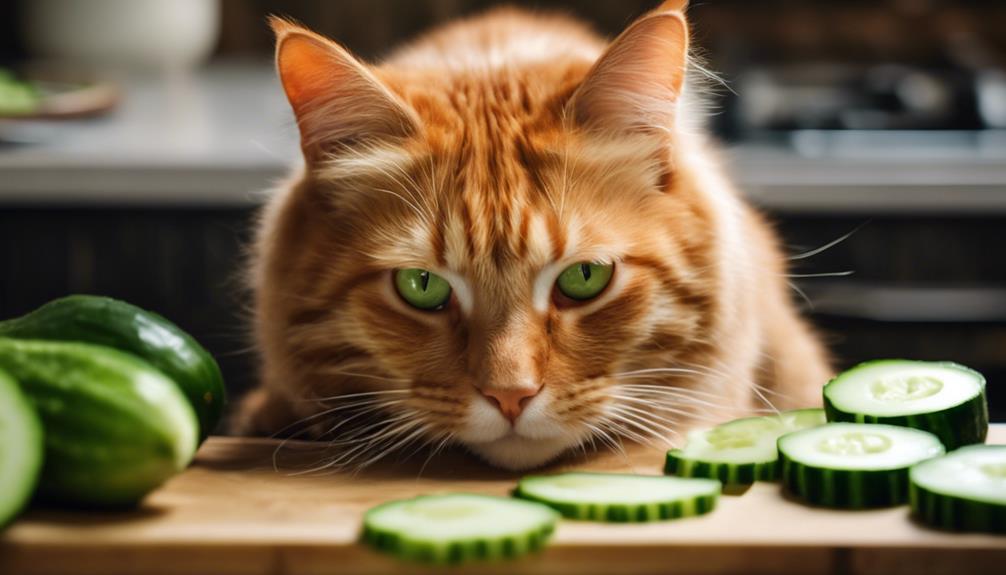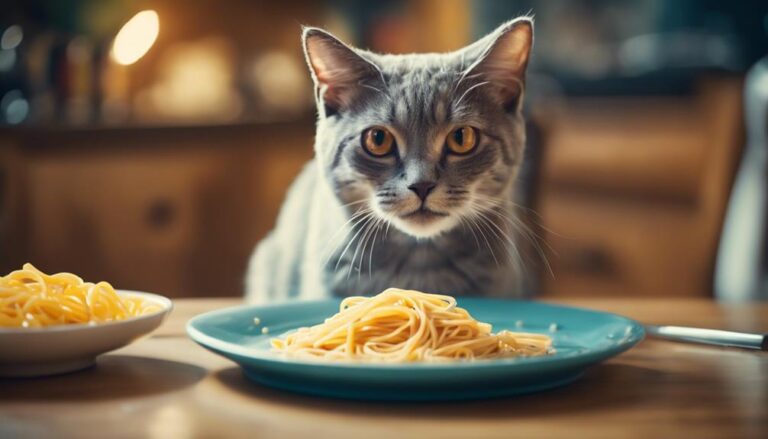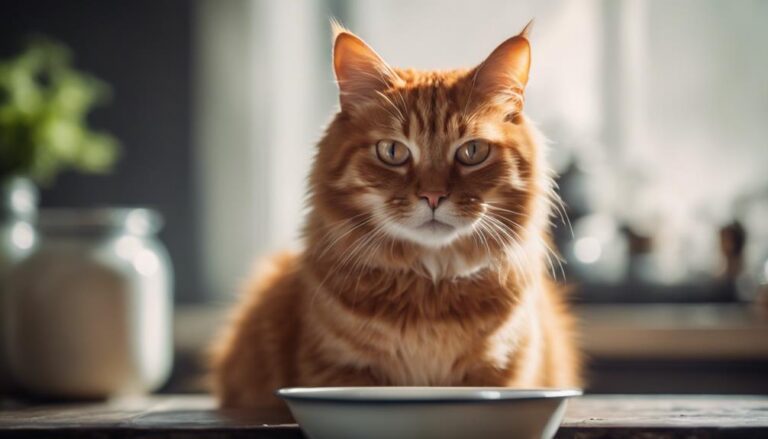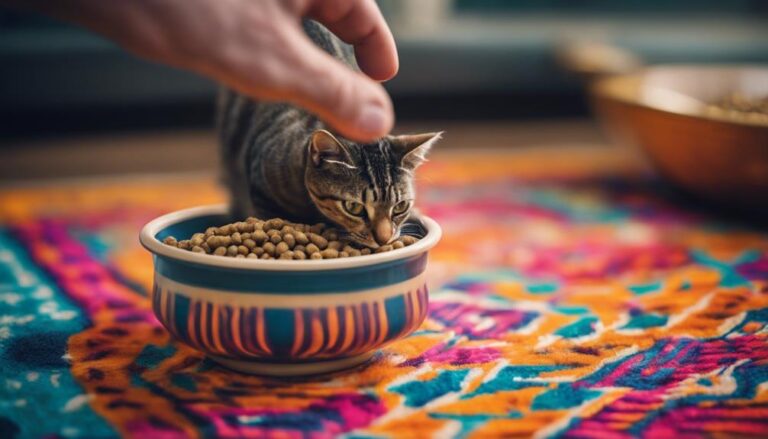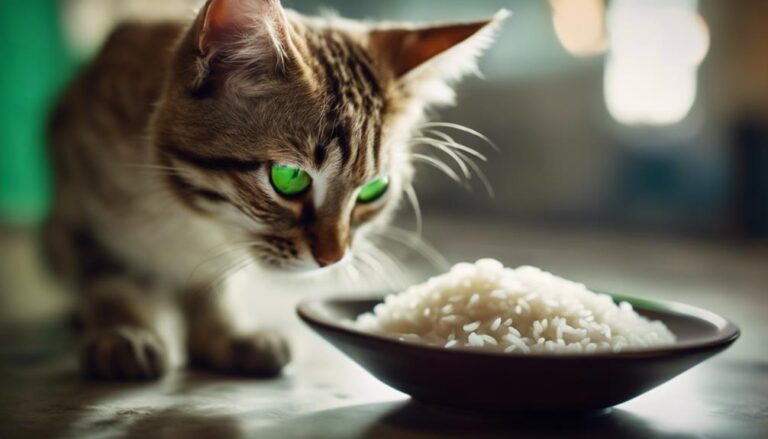You might be surprised to learn that cucumbers can offer both benefits and cautions when it comes to feeding them to your feline companion. While they can provide hydration and essential nutrients, there are potential risks to consider as well. Understanding how to safely incorporate cucumbers into your cat's diet requires attention to detail and moderation. So, before you offer your cat this crunchy treat, consider the guidelines and precautions outlined to ensure their well-being.
Health Benefits of Cucumbers for Cats
Cats can benefit significantly from the health advantages cucumbers offer due to their high water content and essential nutrients.
Cucumbers, being 95% water, are excellent for hydration in cats. The small amounts of essential vitamins like Vitamin K, Vitamin C, and beta carotene found in cucumbers can contribute to your cat's overall health. Additionally, cucumbers provide minerals such as potassium, which is essential for various bodily functions in cats.
The fiber present in cucumbers can aid in digestion support for your feline friend, promoting a healthy digestive system. When feeding cucumbers to your cat, remember to remove the peel and seeds as they contain most of the beneficial nutrients.
Ensuring that cucumbers are given in moderation and prepared correctly can be a nutritious addition to your cat's diet, offering hydration, essential vitamins, minerals, and digestion support.
Nutritional Value of Cucumbers for Cats
Cucumbers offer cat-friendly nutrients that can complement their diet, such as Vitamin K and Vitamin C. Consider the dietary needs of your feline friend before incorporating cucumbers into their meals.
Cat-Friendly Nutrients in Cucumbers
Rich in essential nutrients like Vitamin K, Vitamin C, beta carotene, and potassium, cucumbers offer valuable benefits for your feline companion. These nutrients are easily absorbed by cats, making cucumbers a safe and healthy snack option.
Due to their high water content, cucumbers can help keep your cat hydrated. Feeding small amounts of cucumbers a few times a week can provide additional Vitamin C and other essential vitamins and minerals to support your cat's overall well-being.
Remember that the peel and seeds of cucumbers contain most of the nutrients crucial for your cat's health. Including cucumbers in your cat's diet in moderation can be a nutritious addition to their meals.
Dietary Considerations for Cats
Considering the dietary needs of your feline friend, it's important to recognize the nutritional value that cucumbers can offer as a supplement to their regular meals. Cats can eat cucumber in small pieces as an occasional treat due to their sensitive digestive system. Feeding your cat small pieces of cucumber can provide health benefits such as hydration, essential vitamins like Vitamin K and C, beta carotene, and potassium.
Remember that cats obtain most necessary nutrients from their regular wet and dry cat foods; therefore, cucumbers should be given as a supplement or occasional snack option to ensure a balanced cats diet.
How to Safely Feed Cats Cucumbers
To safely introduce cucumbers into your cat's diet, remember to cut them into small, cat-sized pieces to prevent choking hazards. Make sure to wash the cucumbers thoroughly to remove any dirt or pesticides before allowing your cat to eat them.
Additionally, peel the cucumber to reduce the risk of digestive issues from its high fiber content. Offer only fresh, plain cucumbers to your cat, avoiding pickled or seasoned varieties.
Moderation is key when it comes to feeding your cat cucumbers; limit cucumber treats to a couple of small pieces per week to prevent any potential digestive problems. Remember, cucumbers are low in calories and can be a hydrating snack for your feline friend.
Risks of Feeding Cats Cucumbers
Feeding cucumbers to your cat can pose risks such as digestive issues and potential choking hazards. When considering giving cucumbers to your feline friend, be aware of the following risks:
- Harmful to Cats: Feeding cucumbers in excess can lead to digestive problems like diarrhea or upset stomach.
- Choking Hazard: Cucumber seeds can pose a choking hazard for cats if not removed before feeding.
- High Fiber Content: The high fiber content in cucumbers can cause gastrointestinal discomfort, especially for cats with sensitive stomachs.
- Vomiting: Cats with delicate digestive systems may experience vomiting if fed cucumbers.
It is crucial to be mindful of these risks before incorporating cucumbers into your cat's diet. Keep a close eye on your cat's reaction to cucumbers, and if you notice any signs of discomfort or digestive issues, it may be best to avoid feeding them this particular food.
Moderation in Cucumber Consumption for Cats
When offering cucumbers to your feline friend,
remember that moderation is key to avoid potential tummy troubles.
Keep a close eye on portion sizes
and watch for any signs of digestive discomfort after feeding them cucumbers.
Remember,
a little cucumber goes a long way in treating your cat without upsetting their stomach.
Portion Control for Cats
For cats, maintaining moderation in cucumber consumption is crucial to prevent potential digestive issues. When it comes to portion control for your feline friend, remember these key factors:
- Limit cucumber intake to a couple of small pieces per week to avoid gastrointestinal upset.
- Following portion control guidelines is essential to prevent adverse effects on your cat's digestive system.
- Moderation in introducing cucumbers into your cat's diet will help maintain their overall health and well-being.
- Be mindful of the quantity of cucumbers your cat consumes to ensure they benefit without any digestive disturbances.
Watch for Digestive Issues
Keeping a close eye on your cat's cucumber consumption is essential to prevent potential digestive issues.
While cucumbers are a great snack for cats, feeding them too much can lead to digestive problems.
It's advisable for pet parents to offer only one or two small cucumber slices a couple of times a week to avoid overwhelming your cat's digestive system.
Watching for digestive issues such as vomiting, diarrhea, or changes in appetite after introducing cucumbers can help determine if your cat tolerates them well.
Remember that while cucumbers aren't toxic to cats, moderation is key to prevent any potential gastrointestinal upset.
Gradually introducing cucumbers and monitoring your cat's response can help ensure a positive snacking experience.
Understanding Cats' Preference for Cucumbers
To truly comprehend whether cats favor cucumbers, observe their reactions when presented with this vegetable. Cats' preferences for cucumbers can vary widely, and while some may enjoy the crunchy texture, others may not be interested. Here are some key points to consider:
- Cats are obligate carnivores, meaning their diet should primarily consist of animal protein.
- Cucumbers are rich in beta carotene, which can be beneficial in small amounts but shouldn't replace essential nutrients.
- Offering cucumber slices as an occasional treat can provide extra hydration for your cat.
- It's crucial to introduce cucumbers gradually and monitor your cat for any signs of digestive issues.
Frequently Asked Questions
Is It Safe for Cats to Eat Cucumbers?
Yes, it's safe for cats to eat cucumbers in moderation. They can enjoy this low-calorie snack if cut into small pieces. Avoid pickled cucumbers. Remember, too much can upset their tummy. Keep it moderate for a healthy treat.
Can Cats Eat Banana?
Yes, cats can eat bananas in moderation. They can benefit from the potassium, fiber, and vitamins in bananas. Offer small, mashed pieces as a healthy treat. Watch for any digestive issues and adjust portion sizes accordingly for your cat's well-being.
Can Cats Have Peanut Butter?
Yes, cats can have peanut butter as an occasional treat. It's safe in small amounts and provides protein and healthy fats. Opt for natural, unsalted peanut butter without xylitol. Watch for any allergic reactions or digestive issues afterward.
Can Cats Have Cheese?
Yes, cats can have cheese, but it's not ideal due to lactose intolerance. Cheese may cause digestive issues like diarrhea in most cats. While some may enjoy it in small amounts, it's best as an occasional treat.

